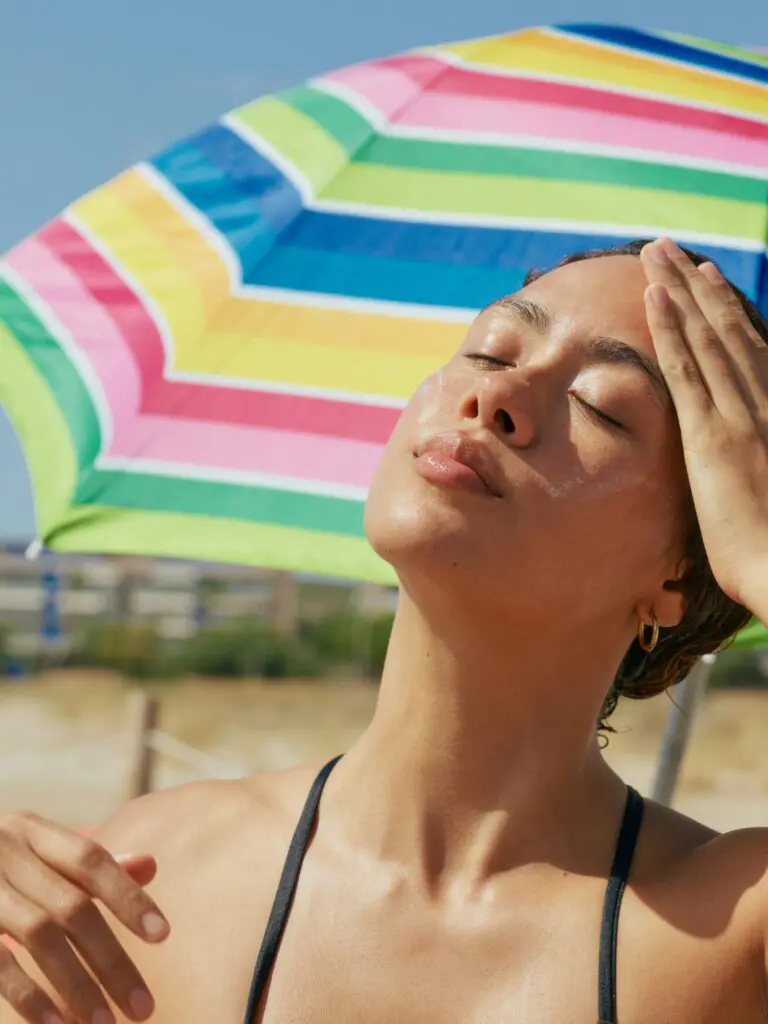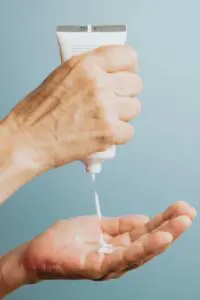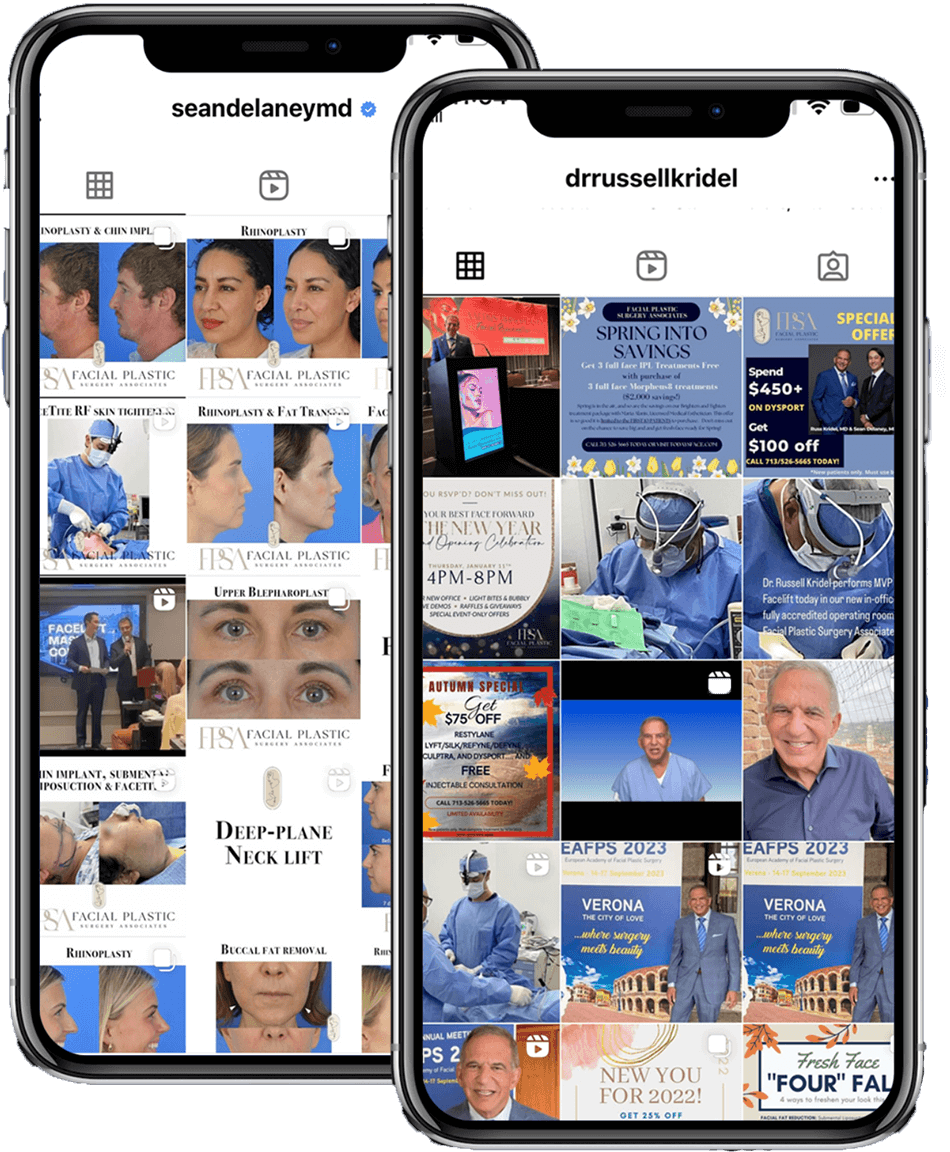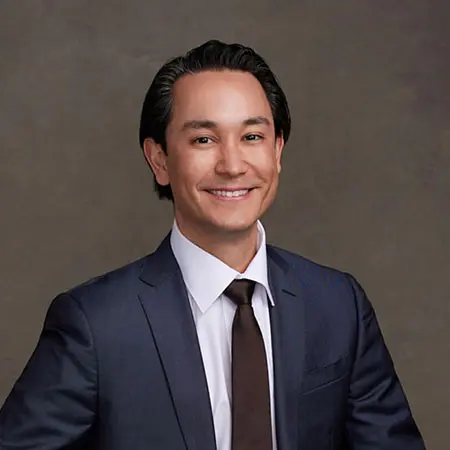April 14, 2025 | Best of the Best Plastic Surgeon in Houston, Board-Certified Facial Plastic Surgeon, CO2 laser skin resurfacing, Facelift, Facial Aging, Laser Resurfacing
10 minute read

We all want to maintain youthful, glowing skin for as long as possible, but the harsh reality is that time, lifestyle choices, and environmental factors can take a toll on our appearance. One of the most effective ways to protect your skin and prevent premature aging and dark spots is simple: sunscreen. Yes, the humble sunscreen is not just a beach-day essential, but a daily must-have to keep your face looking its best. And yes, wear a hat and sunglasses too!
Here’s why applying sunscreen is important in preventing aging and spots on your face.
1. Sunscreen Protects Against UVA and UVB Rays
The sun’s harmful rays can have a major impact on your skin, and these rays come in two forms: UVA and UVB. UVA rays penetrate deep into the skin and are responsible for the breakdown of collagen and elastin, two key proteins that keep your skin firm and smooth. As we age, the production of collagen naturally decreases, and exposure to UVA rays accelerates this process, causing wrinkles, fine lines, and sagging.
On the other hand, UVB rays cause sunburn, but their effects go beyond just redness. Repeated exposure to UVB rays can also trigger skin pigmentation, leading to dark spots or sunspots, which are often most noticeable on the face and neck. The cumulative damage caused by both UVA and UVB rays can significantly speed up the skin’s aging process and affect its overall tone and texture.
2. Prevents Premature Aging (Photoaging)
A major contributor to premature aging is “photoaging,” which is the process of aging caused by prolonged exposure to sunlight. While genetics play a role in the aging process, sun exposure is responsible for up to 90% of the visible signs of aging.
Photoaging manifests itself in the form of wrinkles, fine lines, a loss of skin elasticity, and a rough texture. The skin around your face, particularly the eyes, forehead, and cheeks, is more vulnerable due to thinner skin and frequent exposure. Using sunscreen daily acts as a shield against these damaging UV rays, preserving the firmness and smoothness of your skin.
3. Fights Hyperpigmentation and Dark Spots
One of the most frustrating skin concerns, especially as we age, is hyperpigmentation – the appearance of dark spots or patches on the skin. These dark spots, also known as sunspots or age spots, are usually caused by excess melanin production triggered by sun exposure. Even a small amount of sun exposure can make these spots appear more prominent over time, making your complexion uneven and dull.
If you’re already dealing with dark spots or acne scars, skipping sunscreen can worsen the situation. The sun’s rays exacerbate pigmentation issues, making it harder for the skin to heal and even causing the spots to darken. Applying sunscreen consistently helps prevent new spots from forming and keeps existing ones from getting darker, allowing your skin to maintain a more even tone.
4. Maintains Skin Texture and Smoothness
Over time, exposure to UV rays breaks down collagen and elastin, the building blocks of youthful skin. This results in a loss of skin elasticity and the development of fine lines and wrinkles. But sunscreen doesn’t just protect against deep damage; it also helps maintain the skin’s texture by preventing dryness, roughness, and premature thinning of the skin.
When your skin stays protected from the sun’s harmful rays, it remains smooth, plump, and hydrated. Sunscreen forms an invisible barrier that locks in moisture and preserves the natural structure of your skin, preventing the rough, uneven texture that comes with UV damage.
5. Prevents Sunburn, Which Can Accelerate Aging
While most of us associate sunburn with pain and redness, what’s less obvious is the long-term effect they have on our skin. A sunburn is a sign of damage from UVB rays, and repeated sunburns can accelerate the aging process. When your skin burns, it’s actually experiencing DNA damage, which can lead to premature aging, increased fine lines, and deeper wrinkles over time.
By using a broad spectrum sunscreen regularly, you’re not only preventing burns but also minimizing the long-term effects of that sun damage. This helps ensure your skin remains youthful and vibrant well into your later years.
6. Sunscreen Is the Easiest Anti-Aging Tool
There are countless skincare products out there promising to reduce fine lines, improve skin tone, and give you a youthful glow, but none of them can work as effectively as sunscreen. Sunscreen is the most reliable anti-aging product because it targets the root cause of aging skin—sun damage.
Incorporating sunscreen into your daily routine doesn’t require much effort or expense. Simply choose a broad-spectrum sunscreen with an SPF of at least 30 and apply it to your face and neck every morning. If you are swimming, it is important to re-apply immediately when you get out. Also, if you are exerting yourself and sweating, it is important to dry off and re-apply right away. This one step can go a long way in preserving the health and appearance of your skin.
7. Protects All Skin Types and Tones
No matter your skin type—whether it’s oily, dry, sensitive, or combination—sunscreen benefits everyone. Additionally, many people mistakenly believe that individuals with darker skin tones don’t need sunscreen, but this couldn’t be further from the truth. While darker skin does have more melanin, which offers some natural protection against UV rays, it’s still susceptible to sun damage, premature aging, and hyperpigmentation. Sunscreen is vital for all skin tones to maintain a clear, youthful complexion.
COMMON QUESTIONS ABOUT SUNSCREEN:
Many patients ask Dr. Russell Kridel and Dr. Sean Delaney questions about the use of sunscreen. As facial plastic surgery specialists they understand the importance of women and men using sunscreen.
Are all sunscreens the same?

No. Not all over-the-counter sunscreens are broad spectrum, so it’s crucial to look for this designation on the label when choosing a sunscreen, as it indicates protection against both UVA and UVB rays.
Why is a broad spectrum sunscreen better?
Broad spectrum” sunscreens effectively block both UVA and UVB rays, offering comprehensive protection against the sun’s harmful radiation. It’s important to choose a sunscreen that says “broad-spectrum” on the label—this indicates that the product helps protect against UVB and UVA rays.
Does sunscreen expire?
Yes, sunscreen does expire. The expiration date is typically printed on the bottle or tube. Sunscreen loses its effectiveness over time due to factors such as: Exposure to heat and sunlight, Oxidation of ingredients, and Degradation of active ingredients.
The FDA recommends discarding sunscreen that has expired or is more than three years old, even if it appears unopened. Using expired sunscreen can provide inadequate protection from the sun, increasing the risk of sunburn and skin cancer.
To ensure your sunscreen is effective, check the expiration date and store it in a cool, dark place. If the sunscreen has changed color, consistency, or smell, discard it.
Do I need higher than 30 SPF sunscreen?
Fortunately, SPF 3 sunscreen blocks about 97% of UVB rays which are responsible for sunburns. Higher SPF only offers slightly greater protection, with SPF 50 blocking about 98% of UVB rays. Sunscreens with an SPF of 50 or higher offer minimal extra protection and may be more costly. Individuals who spend extended periods of time outdoors, have a history of sunburn or skin cancer, live in high-altitude or near the equator, or have sensitive skin may benefit from using sunscreen with an SPF higher than 30.
Do I need a sunscreen if my makeup has SPF?
Dr. Kridel confirms, “SPF in makeup is a bonus, not a replacement.” Makeup with SPF is a good addition to your daily routine, but it should not be the only product used for sun protection. SPF in makeup is typically lower than that of dedicated sunscreens, and you’re unlikely to apply enough foundation to achieve the full protection.
Be sure to apply sunscreen first, then makeup with SPF on top!
What does SPF stand for?
SPF stands for Sun Protection Factor and is a measure of how well a sunscreen protects your skin from UVB rays and sunburn.
Is medical grade sunscreen better than drugstore sunscreen?
Using a broad spectrum sunscreen every day is the most important thing you can do whether it is drugstore or medical grade. With that said, over-the-counter sunscreens usually do not contain as many active ingredients as medical grade, such as SkinMedica, Skinceutical or ZO Skin Health products. OTC or drugstore brands contain inactive compounds, fragrances and preservatives, and only about 70% of the pure ingredients required by the FDA. This can leave you with less sun protection.
On the other hand, pharmaceutical grade sunscreen must contain 99.9% pure active ingredients. It also has to be backed up by scientific research and must have been proven beneficial for the skin.
However, pharmaceutical grade sunscreen is also more expensive. It is more important to use sunscreen than go without it at all. So if OTC is your option be sure to read the labels and look for the highest quality broad spectrum product available.
At Facial Plastic Surgery Associates, our medical esthetician can also provide you with a complimentary skin assessment and provide recommendations for medical grade (pharmaceutical grade) sunscreen.
Conclusion
Using a broad spectrum 30 SPF sunscreen on your face and neck daily is one of the simplest and most effective ways to protect your skin from aging and pigmentation. By shielding your skin from harmful UV rays, you prevent premature aging, dark spots, and skin damage, ensuring that your complexion stays youthful, smooth, and even-toned. Don’t wait for wrinkles or spots to appear, make sunscreen your best friend now to enjoy healthy, glowing skin for years to come.
So, whether you’re heading out for a run, hitting the beach, lounging by the pool, or just going about your day, don’t forget to apply sunscreen. It’s not just a step in your skincare routine; it’s a shield that keeps your skin looking youthful and radiant for the long haul.
Interested in Getting Rid of Age Spots and Fine Lines in Houston, TX?
If you would like to get rid of age spots and fine lines from sun damage, there are many treatments available. Some of the treatments include: IPL, Fraxel, Fractionated CO2 Laser Resurfacing and Fully Ablative CO2. Over the years, we’ve helped countless Houston patients address signs of aging due to sun damage. With years of experience and technical skills, Dr. Sean Delaney and Dr. Russell Kridel can help you achieve remarkable and natural-looking results.
Want to find out what we can do for you? Give us a call at (713) 526-5665 or complete our online form to request a consultation.




